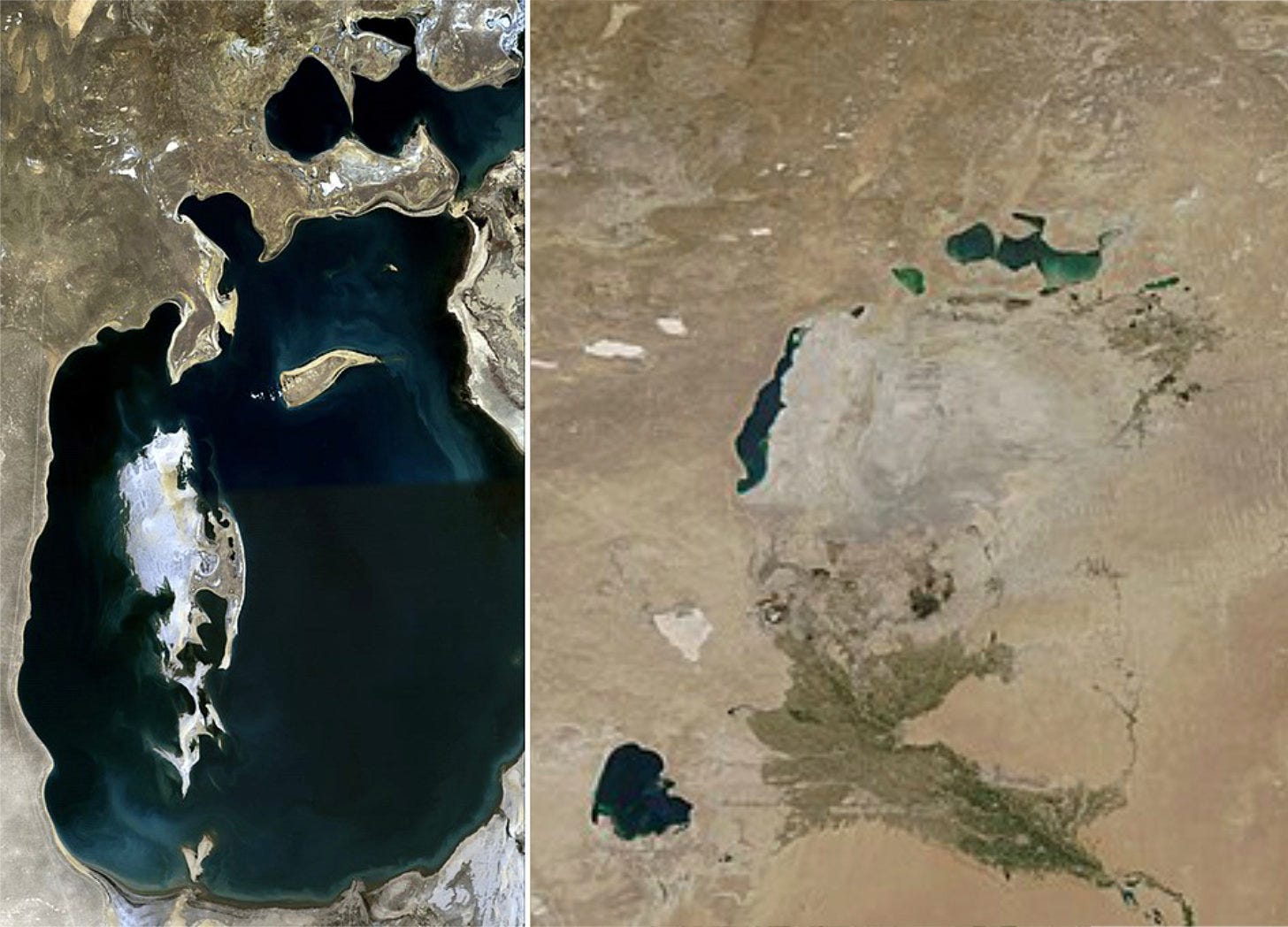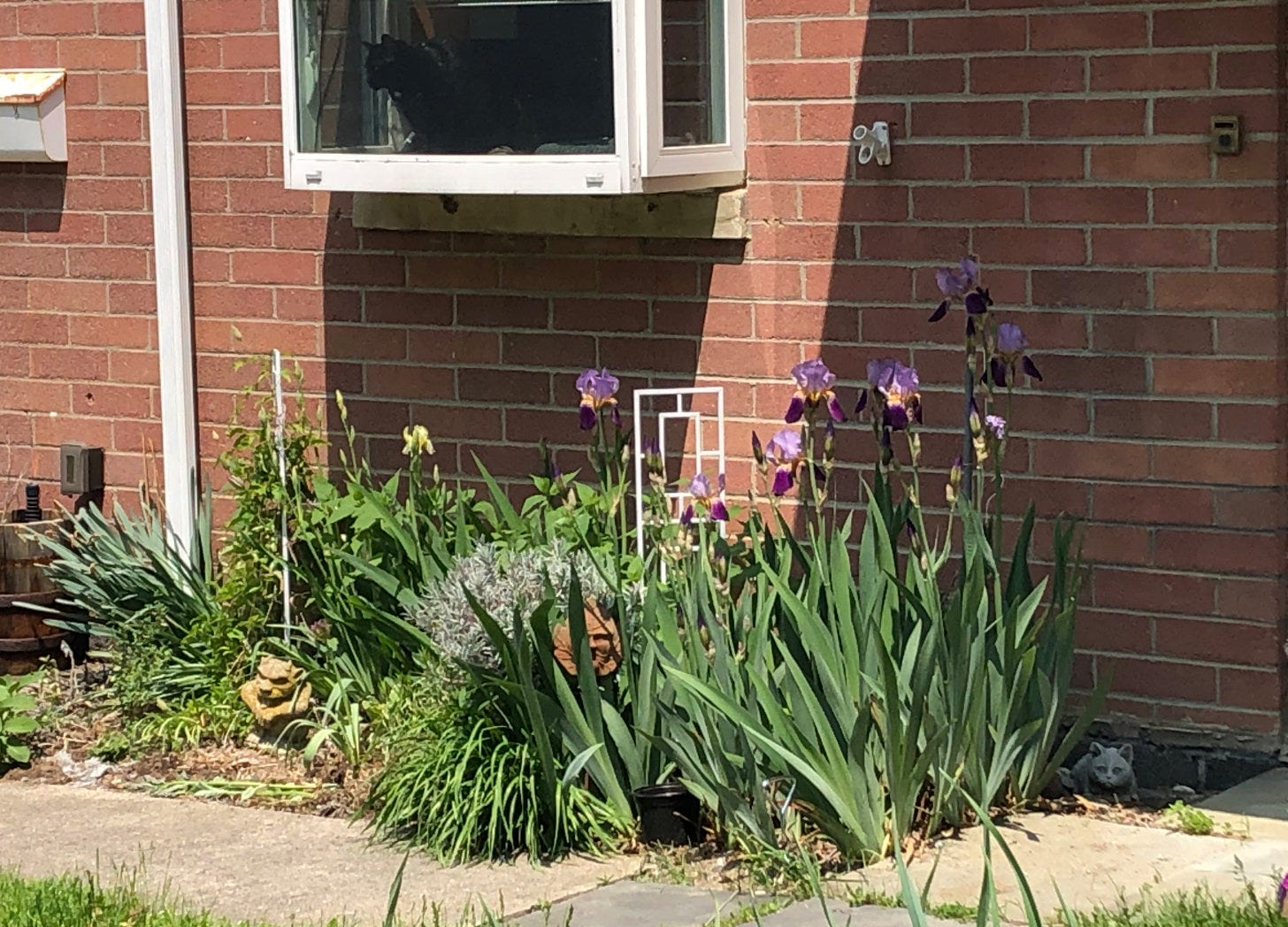Sometime around 2016, I started arguing with socialists on Facebook.
Please don’t laugh at me, I really thought I might change minds.
[I can hear you! Stop it!]
I was naive. But you don’t know until you know, and I gave it my best try. The good thing that came out of about two years of this sort of back and forth was that I learned how valuable it is to have someone to spar with. They would present some issue [such as the minimum wage] and I would then have to thoroughly educate myself around that issue before I could reply. Even if I couldn’t answer right then, the issue would always come back up again. The socialist people I knew then didn’t convince me, in fact, after that I felt even more grounded in my free-market position.
The thing that made me dig in my heels was the Aral Sea.
From early childhood, my mom raised me to be an environmentalist. She was alone. even my grade school was preaching about the evils of how humans were destroying the planet. Corporations were leading this charge, raping the land, and screwing their customers and employees.
A good amount of this went by the wayside when I started studying libertarianism. Arguments that use economic data about what people really do versus what they think they’d like to do convinced me that at least in terms of doing business, humans do better if less management is applied from above. But I still wasn’t sure about the environmental issues.
Surely, SOME control was warranted…
The problem is how that control gets applied once it’s available.
The top-down government of the Soviet Union had no interest in preserving the environment. My socialist opponents liked to wave the flag of the environmental evils of capitalism. But whatever damage Western corporations have done to the earth, it pales in comparison to what the government of the Soviet Union did.
“If you’re not angry, you’re not paying attention,” has been a trope since the 60s, and it was waved like a flag by the people with whom I argued. The desire to change the world is something I understand. I want my fellow humans to be happy, healthy, and productive; creating, inventing, and following where the heart and intuition lead. But is anger the best way to change the world?
The assumption behind this phrase is a moral one. There is so much bad about the world that if we don’t see it, we must be willfully blind. But there’s more. If we’re not angry, then we’re bad people and are both lazy and selfish.
Certainly, anger provides energy that can move people forward through difficult challenges. It helps people support personal boundaries and can indicate where those are located. The emotion has an evolutionary purpose or it wouldn’t exist.
It’s not that anger isn’t justified. I have a hard time even thinking about things like the mutilation of children’s bodies and the slave trade that still exists illegally in the WEIRD world. Not to mention the spreading of the terrible ideas that lead to the destruction of whole ecosystems [that would be any system that centralizes control.] Rage starts to bubble up.
But there’s quite a bit of handwavium going on with this phrase. We’re supposed to be angry at the things that are being pointed at and ignore anything that doesn’t fit the story. The first thing I noticed that didn’t fit the environmental ideological story was the number of chemicals and fertilizers that get sprayed on our food. These have a substantial effect on soil health, human health, and ocean health, and the environmental movement had nothing to say about it although they were spouting rhetoric about the evils of capitalist destruction. Then I started to wonder about the environmental record of the Soviets.
I’d never heard of the Aral Sea. It was [was!] the third-largest lake in the world lying in the region of Kazakhstan and Uzbekistan. In the 1960s, the Soviets decided that they were going to corner the market on cotton and began growing it in the region. Cotton is a water-needy crop and the Aral Sea was handy and large. Cotton also requires a lot of pesticides and those chemicals dispersed back into the watershed.
When the water started dropping, the citizens of the region had no recourse. The centralized government viewed them as a nuisance. Eventually, the entire 26,000 square miles of the lake was gone. There were attempts to restore the eastern side with dams after 2000. But after some initial optimism, that failed. The now dry lake bed is a stew of salt, chemicals, and toxins from soviet weapons testing.

Yeah. I’m angry. But I’m not the one not paying attention.
While the Aral Sea is arguably the worst environmental disaster ever, it wasn’t an isolated incident. There are other examples.
The Caspian Sea had a similar problem. Water being withdrawn for irrigation projects combined with it being a dumping ground.
Lake Baikal lost 50 percent of its animal population due to pollution. The lake was populated by floating islands of sewage.
So much gravel was removed from the banks of the Black Sea for building projects that the entire shoreline collapsed. As many as 300 landslides a year were reported in the 60s.
Water pollution in general was catastrophic. Fish in the Okra, Volga, Ob, Yenesei, Ural, and Northern Dvina rivers were all virtually wiped out. There was no cleaning of factory waste before dumping it directly into any available body of water.
This was only the USSR. Who knows what happening in North Korea, and China has been busy with various forms of environmental degradation.
The problem with being angry about these things is that I have no control over what happened in the Soviet Union or China. I don’t even have control over what’s allowed to be sprayed on our food! [Yes, I’ve written letters, etc.] Getting angry about this just uselessly increases my stress level.
I do have control over how I talk to people. I’m not going to convince noisy socialists that they should be looking at the flaws in their arguments. But I might be heard by people like me who think the socialist story sounds plausible [especially when shouted] but aren’t quite sure.
I have control over what I eat. I can buy food from rangers, farmers, and fishermen committed to producing without chemicals and that use methods that build soil and watersheds instead of destroying them. I can grow some vegetables and cook for myself and my husband.
I have control over how I treat the property I own. I can plant flowers that attract insects and make my neighbors smile.
And I have control over what I’m paying attention to. I’m angry that my time was wasted with bad stories. But maybe that’s just part of being human.
Selina Rifkin, M.S. [Nutrition], LMT, has been to Hades in a handbasket. More than once. This has given her some opinions. Like most of her generation [X] she’s okay with snark. Most days she tries for good writing. But the snark, and side comments creep in. She lives with her husband, and is Mother of Cats; four boyz and one cranky gurl. Selina has written The Young Woman’s Goodlife Guide: Things I Wish I’d Known When I Was 20. Or… Learn From My Pain, and How to Train Your Cat: Using a Clicker and Leash to Keep Your Indoor Cat Happy and Healthy, and the Goodlife Guide to Nutrition.







